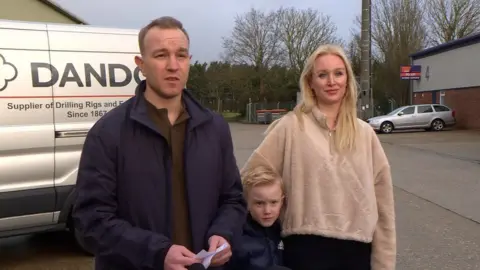Jailed banker 'shocked' and 'disappointed' at appeal decision
 BBC
BBCTom Hayes, the first trader jailed for rigging interest rates, has said he's shocked and disappointed after being refused the chance to take his case back to the courts.
The Criminal Cases Review Commission (CCRC) issued a provisional decision not to refer his case back to the Court of Appeal.
Mr Hayes described the decision as "perverse".
The CCRC said it had done a "detailed and thorough" review of the evidence.
"I can't believe this decision," Mr Hayes told the BBC.
"After five years, and all the evidence we gave them that wasn't in the trial, they've just referred back to false confessions I made to avoid extradition to the United States, when we knew about that in 2015."
Mr Hayes said the decision by the CCRC, the body set up to review miscarriages of justice, was "perverse".
"One may sensibly ask, if the interviews were to be the sole determining factor, why the CCRC spent so long investigating."
In 2015, Tom Hayes was sentenced to 14 years in jail by Mr Justice Jeremy Cooke at Southwark Crown Court, reduced on appeal to 11-and-a-half, after a jury found him guilty of conspiracy to defraud for seeking to "rig" Libor, the benchmark interest rate.
Libor is to interest rates what the FTSE 100 index is to shares. It tracks the real cost of borrowing as measured by the interest rate banks are charging each other to borrow funds.
Every morning at 11am, Libor "submitters" at 16 banks have to answer a question - at what interest rate could you borrow funds today? They submit their answers (eg 3.15%, 3.17%) and an average is taken which becomes Libor.
Mr Hayes's application to the CCRC ran to nearly 3,000 pages setting out evidence to support seven grounds to appeal the case, including evidence not included in the trial.
The grounds included evidence revealed by the BBC, kept from the jury at his trial, that implicated central banks including the Bank of England, in Libor rigging.
The Bank of England has said Libor was not regulated at the time.
The CCRC decision focuses on confessions of dishonesty by Tom Hayes which he says were false, made in order to avoid extradition to the United States.
Before he decided to contest his trial, Mr Hayes, desperate to avoid extradition after the US Attorney General had publicly condemned him, applied to enter a witness protection programme under the Serious and Organised Crime and Police Act 2005.
To enter the programme, he had to admit he'd acted dishonestly in interviews with the Serious Fraud Office. It was expected that he'd plead guilty, give evidence against other defendants and receive a reduced sentence. However, he later dropped out of the programme to plead not guilty and contest his trial.
Mr Hayes said: "If the task for the jury was to assess the validity of those admissions or otherwise, it was a task to be performed in the context of the other evidence presented at trial. That evidence failed to include much fresh evidence we've discovered and a material failure to disclose evidence relating to the Bank of England has been deemed 'immaterial'.
A spokesman for the CCRC confirmed it had reached a provisional decision not to refer his case to the Court of Appeal after a "detailed and thorough" review.
"Mr Hayes's representatives provided the CCRC with extensive submissions and material throughout the course of the review," the spokesman said in a written statement.
"In addition to the voluminous material provided by Mr Hayes's representatives, the CCRC has used its powers under section 17 of the Criminal Appeal Act 1995 to access extensive materials held by the Crown Court, the Court of Appeal and the Serious Fraud Office. The CCRC has also instructed two experts to provide specialist evidence and opinion on the case."
